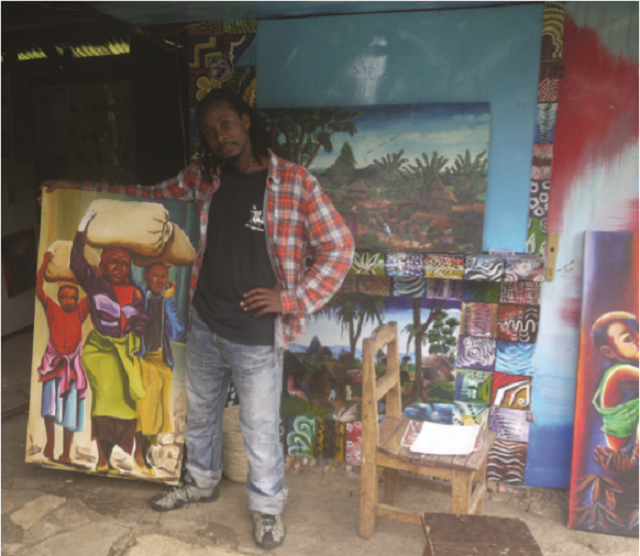
There is urgency of this message in Zulu’s works
If there is a word Rwanda artists Mohamed Ndabaye, who is also known by his artistic name Zulu, likes to use when describing why he paints, it is “to immortalise”.
“I created this painting to celebrate the joy of motherhood and immortalise the struggles African women face to maintain life,” says the artist as he points at one piece hanging in his gallery at Red Rocks Rwanda Intercultural Centre in Nyakimana village, 7km from Musanze town.
“Celebrating Women” is an 80x20cm lifelike portraiture of a typical African woman, to who nature gave the responsibility of not only giving birth to life but also nurturing it.
It depicts a woman carrying her child on her back, heading into the future. She is depicted as a giver and nurturer of life through colour, light and shade. Most of the portrait is in dark hues, representing an evening after a weary day spent walking to search of the future, (represented on the canvas by bright colors ahead), there’s a halo on the heads of both the child and the mother, which symbolises their dreams for a prosperous future.
Another painting titled `Old Rwanda’ is larger and straight out of Zulu’s prodigious imagination. From 2014, Rwanda has successfully tried to eliminate the traditional grass-thatched houses, locally known as Nyakatsi through a project known as “Bye Bye Nyakatsi”
For an artist who grew up when these traditional houses were no longer there, Zulu had to rely on the tales of his grandmother to imaginatively reconstruct how a typical Rwanda home used to be in ancient times.
This painting portrays a traditional homestead, rich, thick foliage of green bananas leaves seen behind grass thatched houses, women carrying bundles of firewood as they approach their respective houses, men digging on their gardens, children frolicking joyously on the vast compound, and black birds beating their wings as they fly above green hills while dogs sit lazily on their haunches.
“This is how my grandmother told me it used to be. It was simple life then, surrounded by the abundant flora and fauna of nature. This piece of painting immortalises our pristine past, our rich social and cultural history,” explains Zulu.
While many of Zulu’s works reflect on the rich Rwandan culture, it is his works on the African woman that stand out for most visitors. They are historical representations enmeshed with salient messages because Zulu uses colour and composition to give a realistic and honest glimpse of society’s view of them; the marginalised and underrepresented.
In another 80x20cm acrylic on canvas piece, he depicts three weary women, with sacks of potatoes balanced on their heads, walking towards the market to sell. They probably have hawked the potatoes door-to-door as happens in rural areas, before rounding off with the market.
This portrait is juxtaposed with men, smoothly riding by on their bicycles, heading the same direction, with similar potato sacks secured on the carriers.
Though not provocative, this portrait, named “Market Walk” interrogates why traditional African women have to work extra hard to do the same kind of work that men do.
Zulu’s art typical African, where the woman is depicted as tenacious and resilient. She is usually shown in a rural setting, waking up at dawn to fetch water, cook, sweep, garden, and go off to market to buy or sell, all the time with a child on her back. This is what society expects. Her life is arduous and mostly uncelebrated.
But you cannot also fail to detect that, apart from these paintings that depict the traditional life, and the bittersweet life of an African woman, there’s one painting that symbolises the image of a modern, liberated, carefree woman.
The “Modern Woman” painting is a glossy, pin-up depiction of a gorgeous African modern woman, her body represented in pink colors, and thick red lipstick on her pouted mouth, posing as women now do when taking their selfies. This is a bombshell of modern concept of beauty and general indulgence. Zulu clearly wants to immortalise that too.
****
editor@independent.co.ug
 The Independent Uganda: You get the Truth we Pay the Price
The Independent Uganda: You get the Truth we Pay the Price



